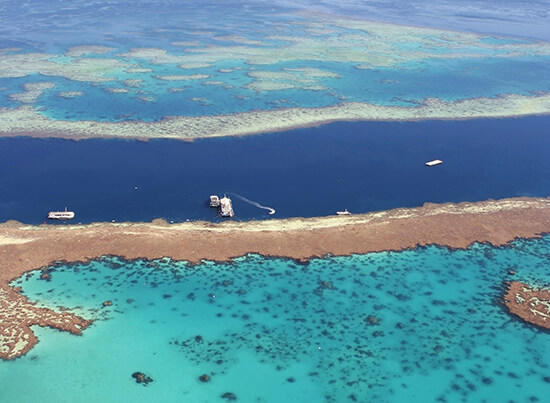How to Visit the Great Barrier Reef
This article was taken from the latest issue of our travel magazine, The Experts.
I could see the green glow of envy in my friends’ eyes when I told them about my plans to visit the Whitsundays and Great Barrier Reef. It had been quite a few years since I’d spent an unforgettable three days sailing the region on a boat with a group of backpackers. Back then I had neither the budget nor time to scuba dive and experience the reef up close, so this time I was determined to make the most of my visit with a bespoke Journey. The Great Barrier Reef is undeniably one of the world’s best dive sites. Stretching 2,300km (1,429 miles) along the east coast of Australia, it’s the most extensive reef system in the world. And, for something so big, simply doing a day trip doesn’t do it justice.

Welcome to Reefworld
I flew to Hamilton Island in the Whitsundays where I was transported to the magical-sounding Reefworld. Located on a pontoon over Hardy Reef, Reefworld is like a miniature water hotel 40 nautical miles from shore. It has three full-time caretakers onboard who keep the facilities (including two hot showers) in working order and make sure the guests are safe and comfortable at all times.

Underwater safari
If you’re opposed to getting wet, the pontoon offers a front-row seat on the reef and its 1,625 species of fish via its underwater observatory. And if you’re lucky, like I was, you might also meet one of the local sea turtles, Chip or Chunk, named after the respective missing parts of their shells. Incredibly, Reefworld also has its own semi-submersible, which operates guided tours along the reef shelf every 30 minutes or so. Emma was the guide for the tours I took. She has a fondness for the rainbow-coloured parrotfish that are responsible for a lot of the sand in this region. I won’t go into detail on how this happens, but I can tell you it involves their digestive system!
After the submersible tour, I was ready and raring to dive in. For expert guidance in the water, Reefworld offers supervised snorkelling safaris and a range of equipment you can borrow. On this trip though, I wanted to go a little deeper and challenge myself a little further, so I signed up for an introductory scuba dive.
Into the blue
Before the dive began we went through the basics, such as how to use the mouthpiece and communicating with signals underwater. As I was practising in the pool underneath the pontoon I felt a sense of dread wash over me as I thought about all the equipment and what I would need to do with it once I was underwater. I needn’t have feared. Introductory divers are paired up with an instructor (either two-to-one or one-on-one) and my guide, Cassandra, took care of all these bits for me, leaving me to just breathe and enjoy the incredible experience.

For the next 30 minutes Cassandra led me along the reef shelf and into a scene from Finding Nemo. Schools of tropical fish in all shades of bright blues, yellows, oranges, pinks and deep purples swam around me and my flippers, completely oblivious to my amazement. As we delved deeper towards the reef I feasted my eyes on corals of every shape and texture. Like an aquatic forest of sorts, the reef was alive with action from sea sponges swaying, clownfish dancing, anemones pulsating and sea clams snapping shut with the tide. The colours and movement were hypnotic and I strained my eyes to take it all in.
All too soon it was time to come up. We stopped to pop our ears and pose for a photo before Cassandra led me back up onto the pontoon. This was my first ever dive experience in open water and it was undeniably the best place to do it.

Sleeping on the reef
Luckily the dive was just the start of my experience. Next I was set to take part in the ‘Reefsleep’ which meant this pontoon would be my home for the night. At 3pm the boats departed with the daytrippers, leaving just nine people, the soothing sound of the water and an ocean full of fish. My ‘room’ for the night was a swag (a cocoon-like sleeping bag with a hood), which was laid out on the sun deck under a blanket of stars, easily the best camping experience I’ve ever had.
After a guide cooked up a big Aussie barbecue dinner for us, we returned to the underwater observatory to see the ocean by night. Small fish that were being lured by the light of the pontoon had attracted a school of large groupers who lurked behind them hungrily. We watched their game of cat and mouse before all the excitement and exertion of the day caught up with us and we walked drowsily towards the swags upstairs. To my surprise (and delight) I found that fluffy pillows and fresh sheets had been placed inside them. Soon I was drifting off to the sway of the ocean and squawks of passing sea birds…

Rise and shine and swim
The next morning there was no need to set an alarm. I sensed an orange glow penetrating my swag and, when I poked my head out from under the hood, was rewarded with a view of the best sunrise I have ever seen. The sky and water were alight in a fiery mixture of orange, red and purple. After a generous breakfast, the nine of us seized the opportunity to have the reef to ourselves. Under the watchful eye of the crew we set about snorkelling underwater to our heart’s content. I couldn’t believe the difference in the sea life compared with the previous day – it was like rush hour for fish down there. I found myself marvelling at the different shapes and bright blues of the coral. I even swam alongside a turtle (it may have been Chip or Chunk – he swam too fast for me to tell!).

Flying over the reef
When the day boats arrived at 11am I felt a little sad to be sharing the reef again – not that there isn’t enough to go around! But my mood quickly changed when I realised what was next on my itinerary: a helicopter ride back to Hamilton Island. I know what you’re thinking and, yes, Reefworld even has floating helipads! As soon as we took off, we were surrounded by the opal colours below, and not long after we were flying over the iconic Heart Reef, one of the most photographed sections of the Great Barrier Reef. As we circled it, I had a true ‘pinch myself’ moment.

Cruising the Whitsundays
I was only on Hamilton Island for another night before I was back on the water – this time cruising around the Whitsundays on another seafaring experience. Today’s trip was to be less about the reef and more about beach relaxation, which suited me just fine, especially considering I was set to visit one of the best beaches in the world. While the Whitsundays is home to 74 islands, the most famous of them is Whitsunday Island (a little confusing, I know). Whitsunday Island is home to a beach that is often named the best in Australia, the incomparable Whitehaven.

Whitehaven heaven
Famed for its almost 100% pure silica sand, Whitehaven is named after its blinding white colour. Setting foot on the beach I was blown away by how soft the sand was. As the coastline stretches for over four miles, it was easy to find a patch all to myself to sit back and take in the staggering scenery. After a dip in the ocean, which was an inviting 24˚C, it was soon time to board the boat and head back to Hamilton Island. On the way back the boat took us the scenic route, sailing past the staggering mosaic of white sand and emerald rivers known as Hill Inlet. I raised my camera for one last shot, trying to capture another moment of this unforgettable trip that I will look back on fondly, and talk about forever.
Ready to dive into one of Australia's most beloved icons: the Great Barrier Reef? Speak to one of our Travel Experts about booking out Great Barrier Reef in-Depth Journey today.




